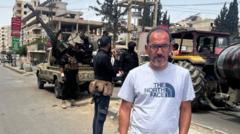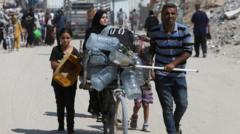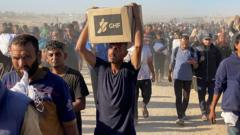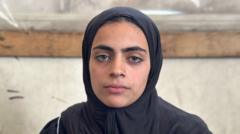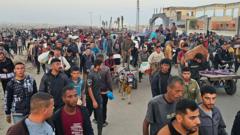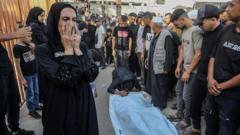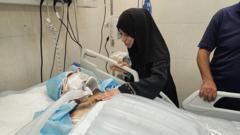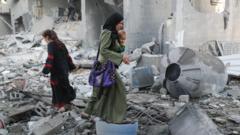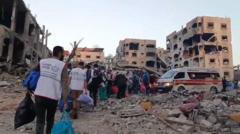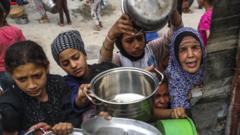**A tragic airstrike on a Gaza hospital has drawn widespread condemnation and raised serious concerns regarding press freedom and humanitarian conditions in the region.**
**Tragedy Strikes Gaza: Five Killed, Including Three Journalists, in Hospital Airstrike**
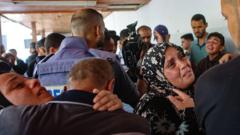
**Tragedy Strikes Gaza: Five Killed, Including Three Journalists, in Hospital Airstrike**
**International Outcry Over Attack as Media and Humanitarian Access Remains Restricted**
In a devastating airstrike on al-Ahli hospital in Gaza City early Thursday, five individuals lost their lives, including three journalists, according to reports from the Anglican Church that operates the facility. The Episcopal Diocese of Jerusalem strongly condemned the incident, expressing outrage at the attack, which also left more than 30 people injured, including hospital personnel and bystanders. The Palestinian Journalists' Syndicate has labeled the strike as a "war crime" committed by Israel.
The Israeli military contends that the airstrike, which occurred within the hospital's compound, targeted a Palestinian Islamic Jihad (PIJ) fighter believed to be using the hospital grounds as a command center. There was no immediate response from Israeli officials regarding the incident, which comes amidst heightened tension and ongoing military actions.
As journalists continue to face dire threats while covering the conflict, numerous global media organizations, including the BBC, have collectively urged for immediate access to Gaza for international media teams, coupled with the need for enhanced protections for local reporters working in perilous conditions. The letter, coordinated by media advocacy groups, highlighted the unprecedented access restrictions over the past 20 months, directly challenging the integrity of press freedom in the region.
In the wake of the airstrike, various reports indicated that the three deceased journalists were identified as Ismail Badah, Soliman Hajaj, and Samir al-Refai, all of whom were operating under severe risk to document the ongoing conflict. Reports from the scene detailed chaotic moments following the attack, with many rushing to aid the wounded who lay critically injured.
An escalating humanitarian crisis in Gaza continues, with organizations reporting that at least 37 individuals had been killed in the preceding 24 hours due to ongoing Israeli airstrikes across various regions. Humanitarian dimensions are worsening amidst a humanitarian blockade that has left millions vulnerable.
The Israeli military has rebuffed allegations of targeting journalists, reiterating claims that armed groups are exploiting civilian locations for operations. The circumstances under which hospitals lose their protections under international law remain a contentious point of discussion, particularly in light of repeated strikes against such establishments.
As figures indicating rising fatalities are reported, the International community remains vocally divided on the ongoing conflict, grappling with the challenges surrounding effective humanitarian response and the implications for press freedoms within conflict zones.
The Israeli military contends that the airstrike, which occurred within the hospital's compound, targeted a Palestinian Islamic Jihad (PIJ) fighter believed to be using the hospital grounds as a command center. There was no immediate response from Israeli officials regarding the incident, which comes amidst heightened tension and ongoing military actions.
As journalists continue to face dire threats while covering the conflict, numerous global media organizations, including the BBC, have collectively urged for immediate access to Gaza for international media teams, coupled with the need for enhanced protections for local reporters working in perilous conditions. The letter, coordinated by media advocacy groups, highlighted the unprecedented access restrictions over the past 20 months, directly challenging the integrity of press freedom in the region.
In the wake of the airstrike, various reports indicated that the three deceased journalists were identified as Ismail Badah, Soliman Hajaj, and Samir al-Refai, all of whom were operating under severe risk to document the ongoing conflict. Reports from the scene detailed chaotic moments following the attack, with many rushing to aid the wounded who lay critically injured.
An escalating humanitarian crisis in Gaza continues, with organizations reporting that at least 37 individuals had been killed in the preceding 24 hours due to ongoing Israeli airstrikes across various regions. Humanitarian dimensions are worsening amidst a humanitarian blockade that has left millions vulnerable.
The Israeli military has rebuffed allegations of targeting journalists, reiterating claims that armed groups are exploiting civilian locations for operations. The circumstances under which hospitals lose their protections under international law remain a contentious point of discussion, particularly in light of repeated strikes against such establishments.
As figures indicating rising fatalities are reported, the International community remains vocally divided on the ongoing conflict, grappling with the challenges surrounding effective humanitarian response and the implications for press freedoms within conflict zones.



